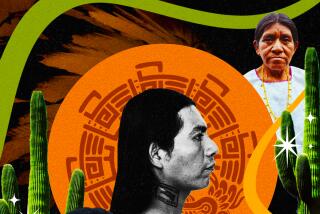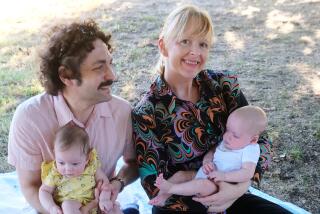The Trials of Translation
- Share via
JUST BEFORE HIS ASCENSION, Jesus gathered his disciples atop a mountain in Galilee and commanded, “Go ye into all the world and preach the Gospel to every creature.”
Easier said than done. Of the world’s 5,445 known languages, 3,800 have never been written down. More than 300 million people speaking 3,180 languages have never seen a Bible in their native tongue. It’s no wonder then that missionaries, whose success is measured by their ability to communicate complicated spiritual concepts, worry more about diction as dogma.
Papua New Guinea’s national language is Pidgin, a bastardized plantation patois in which God is the Bikpela (Big Fella) and “shepherds keeping watch over their flock by night” reduces to “ wasman bilong sipsip was ol long nait. “ But mastering Pidgin is only the first step toward learning one of the country’s 700 tribal dialects, each as different from the other as Latin is from Mandarin. Only 50 have a written Bible. Translators are working on an additional 150, but progress is slow. It takes an average of 15 years just to translate the New Testament. Native tongues may lack a technical vocabulary, but they are detailed and subtle when it comes to agriculture and mechanical skills. In the Namia language group, for example, there are 20 verbs that mean “to cut.”
“I didn’t realize this until one day a group of young men asked me to explain circumcision,” says Wycliffe translator Tom Feldpausch. “When I mistakenly used the verb ‘to cut off’ instead of that to cut a piece off, their eyes widened, and one asked in horror, ‘Did the Israelites really do that?’ We got everything straightened out eventually, but for a moment I was on the verge of driving them all back to animism.”
The Bible is a story of shepherds, merchants and Roman centurions who live in a semi-arid world of vineyards and olive trees. How can their actions be explained to a native of Oceania who has never seen a sheep or tasted wine, and where the most highly prized animal is the pig? Why didn’t Jesus serve yams and bananas instead of bread and wine at the Last Supper? To preempt questions like this, the first book that Protestant missionaries translate is not Genesis or the Gospel of Matthew but a pamphlet called “How the Jews Lived.”
In neighboring Indonesia, the national language, Bahasa Indonesia , is spoken throughout most of the archipelago’s 3,000 islands, but verbal traps still abound for the novice linguist. The word for woman, ibu , is easy to confuse with ubi , which means cassava. “After seven years in Borneo I still occasionally call a young lady a cassava root,” admits missionary Jim Nottingham.
As in English, many Indonesian words have similar pronunciation and spelling but far different meanings. Kepala , the term for head, resembles kelapa , the word for coconut . The word for sin, dosa , is almost identical in pronunciation to doa , which means to pray . Earlier this year American missionaries in West Kalimantan groaned in sympathy when a young Australian colleague began his first church service in Pontianak by exhorting his congregation, “Let us all bow our coconuts and sin together.”
More to Read
Sign up for Essential California
The most important California stories and recommendations in your inbox every morning.
You may occasionally receive promotional content from the Los Angeles Times.













